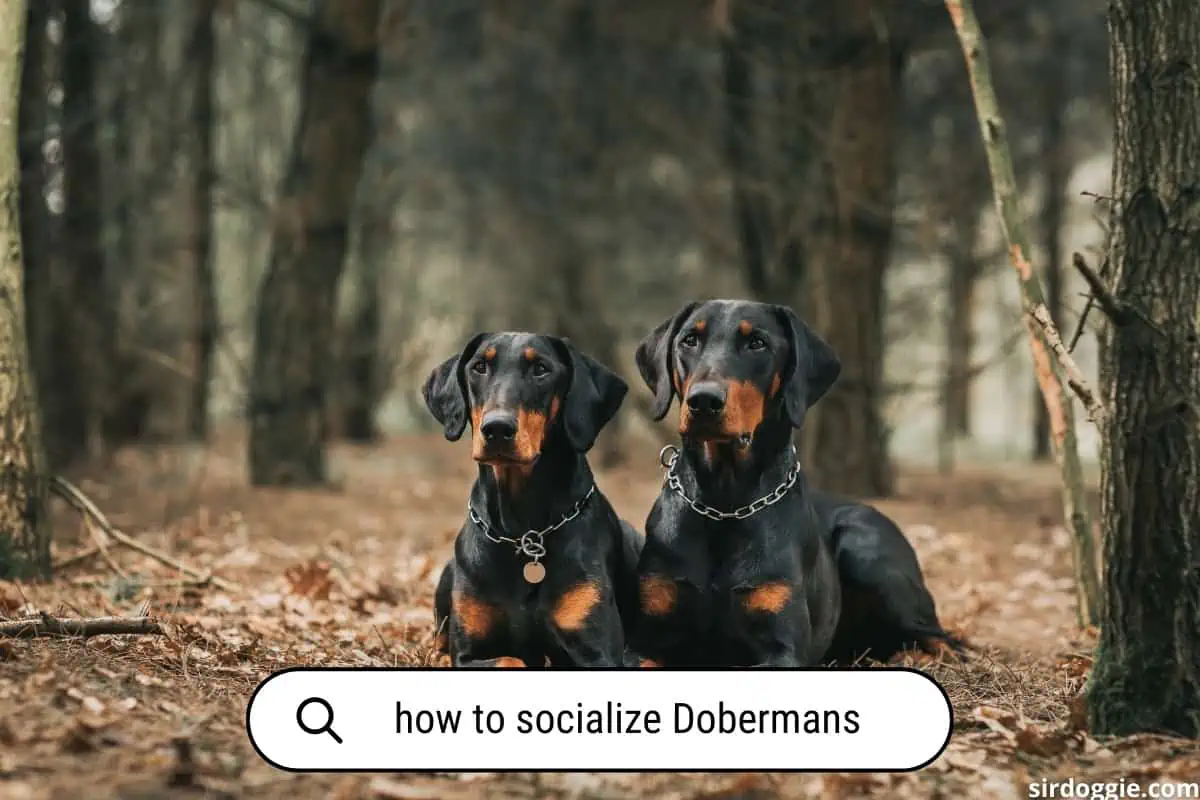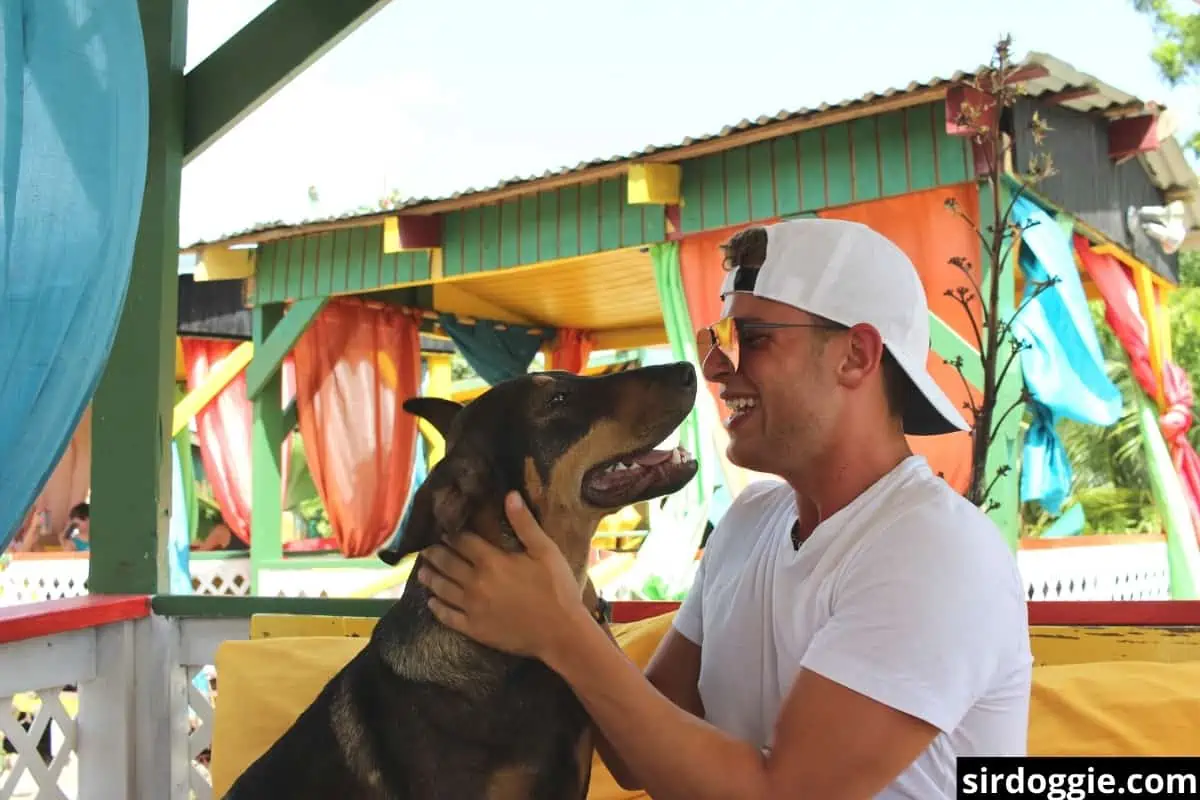How to Socialize Your Doberman (Risk Avoidance)
Dobermans are known for their loyalty, intelligence, and protective nature. However, without proper socialization, these traits can lead to aggression and fearfulness towards strangers and other animals. Socializing your Doberman is essential to ensure they are well-adjusted and happy pets.

When socializing your Doberman, it’s important to start early and expose them to a variety of people, animals, and environments. This helps them develop confidence and trust in their surroundings, making them less likely to react negatively in new situations.
It’s important to note that socialization doesn’t just mean exposing your Doberman to new experiences. It also involves teaching them appropriate behavior and manners, such as not jumping on people or pulling on the leash. With patience, consistency, and positive reinforcement, you can help your Doberman become a well-behaved and socialized companion.
7 Signs Your Doberman is Not Well-Socialized

- Aggression: Your Doberman may growl, snarl, or snap at other dogs or humans during interactions, showing signs of aggression due to fear or discomfort.
- Excessive fear: Your Doberman may cower, shake, or try to escape when exposed to new situations, people, or animals, indicating an extreme fear response.
- Inability to relax: In social situations, your Doberman may remain tense and unable to settle down, constantly on high alert and unable to enjoy the company of others.
- Lack of play skills: Your Doberman may not understand how to engage in play with other dogs, leading to rough or inappropriate play behavior.
- Overreacting to stimuli: Your Doberman may become excessively agitated or fearful in response to everyday stimuli, such as the sound of a doorbell, passing cars, or people walking by.
- Poor leash manners: Your Doberman may excessively pull, lunge, or bark at other dogs or people while on leash, making it difficult to walk them in public.
- Inability to share resources: Your Doberman may become aggressive or overly possessive around food, toys, or sleeping areas, making it challenging to interact with other pets or humans.
These signs indicate that your Doberman may not be well-socialized and could benefit from further socialization efforts, training, or professional guidance. Proper socialization is crucial for your dog’s mental well-being and ability to navigate various social situations with ease.
Why Socializing Your Doberman is Important
Dobermans are known for their loyalty, intelligence, and protective nature. However, without proper socialization, these traits can become problematic.

Socialization is the process of exposing your dog to different people, animals, and environments to help them become well-adjusted and confident. Here are a few reasons why socializing your Doberman is important:
Firstly, socialization helps your Doberman become more comfortable and confident in new situations. Without proper socialization, your Doberman may become fearful or aggressive in unfamiliar environments, making it difficult to take them on walks, to the vet, or to social events.
Secondly, socialization can help prevent behavior problems. Dogs that are not socialized may become anxious, destructive, or aggressive, which can lead to problems such as biting, excessive barking, or destructive chewing. Socializing your Doberman can help prevent these issues and ensure that they are well-behaved and happy.
Finally, socialization can help strengthen the bond between you and your Doberman. By exposing them to different people and environments, you can help them develop trust in you as their owner and build a stronger relationship.
When to Start Socializing Your Doberman
Dobermans are known for being loyal and protective dogs. However, they can also be prone to aggression if not socialized properly.
Socialization is the process of exposing your Doberman to different people, animals, and environments to help them become well-adjusted and confident dogs. So, when should you start socializing your Doberman?
The short answer is as soon as possible. Puppies have a critical socialization period from 3 to 14 weeks old. During this time, they are most receptive to new experiences and are more likely to form positive associations with people and other animals. However, socialization should not stop after this period. It should be an ongoing process throughout your Doberman’s life.
It’s important to note that socialization does not mean exposing your Doberman to dangerous situations. Always prioritize your dog’s safety and well-being. Start by introducing them to friendly, vaccinated dogs and people you trust. Gradually expose them to new environments, sounds, and experiences in a positive and controlled manner.
Remember, socialization is key to having a well-behaved and happy Doberman. Start early and make it a part of your dog’s routine. With patience and consistency, you can help your Doberman become a confident and socialized dog.

How to Socialize Your Doberman
Positive Reinforcement Training
Training your Doberman using positive reinforcement is a great way to socialize them. Rewarding good behavior with treats, praise, and affection will help your dog associate positive experiences with socialization. Start with basic commands like “sit,” “stay,” and “come” and gradually introduce more advanced commands as your dog becomes more comfortable.
Exposure to Different People and Animals
Expose your Doberman to different people and animals to help them become more socialized. Take them on walks in busy areas, introduce them to new people, and let them interact with other dogs. Make sure to keep a close eye on your dog’s behavior and body language to ensure they are comfortable and not feeling overwhelmed.
Dog Parks and Playdates
Dog parks and playdates are great opportunities for your Doberman to socialize with other dogs. However, it’s important to make sure your dog is comfortable and ready for this type of interaction. Start with short visits to the park and gradually increase the time spent there. Supervise your dog at all times and be prepared to intervene if necessary.

Obedience Classes
Enrolling your Doberman in obedience classes is another great way to socialize them. Not only will they learn important commands and skills, but they will also be exposed to other dogs and people in a controlled environment. Look for classes that use positive reinforcement training methods and have experienced trainers.
Common Socialization Mistakes to Avoid
When socializing your Doberman, it’s important to avoid common mistakes that can hinder their progress. Here are some mistakes to watch out for:
- Not starting early enough: Socialization should begin as early as possible, ideally when your Doberman is between 3 and 14 weeks old. Waiting too long can make the process more difficult and time-consuming.
- Not exposing them to enough people and situations: It’s important to expose your Doberman to a variety of people, places, sounds, and experiences. This helps them become well-rounded and adaptable dogs.
- Pushing them too hard: While it’s important to expose your Doberman to new things, it’s also important to do so at a pace that they’re comfortable with. Pushing them too hard can cause them to become fearful or anxious.
- Not rewarding good behavior: Positive reinforcement is key when socializing your Doberman. Make sure to reward them for good behavior, such as approaching new people or staying calm in new situations.
- Not being consistent: Consistency is important when socializing your Doberman. Make sure to expose them to new things on a regular basis and reinforce good behavior consistently.
By avoiding these common socialization mistakes, you can help your Doberman become a well-adjusted and confident dog that is comfortable in a variety of situations.

Conclusion
Training a Doberman to socialize can be challenging, but it is important for their well-being and safety. By following the tips and techniques outlined in this article, you can help your Doberman become a well-adjusted and friendly companion.
Remember to start socializing your Doberman at a young age, expose them to a variety of people, animals, and environments, and use positive reinforcement to reward good behavior. Consistency and patience are key.
It is important to always supervise your Doberman during socialization and be aware of their body language and behavior. If they show signs of fear or aggression, remove them from the situation and seek professional help if necessary.
With time and effort, your Doberman can learn to enjoy socializing and become a beloved member of your family and community.

Family Dog Expert Author
Hi there! I’m Stuart, a devoted dog lover and family dog expert with over a decade of experience working with our furry companions. My passion for dogs drives me to share my knowledge and expertise, helping families build strong, loving bonds with their four-legged friends. When I’m not writing for SirDoggie, you’ll find me hiking, playing with my beautiful dog, or studying music.